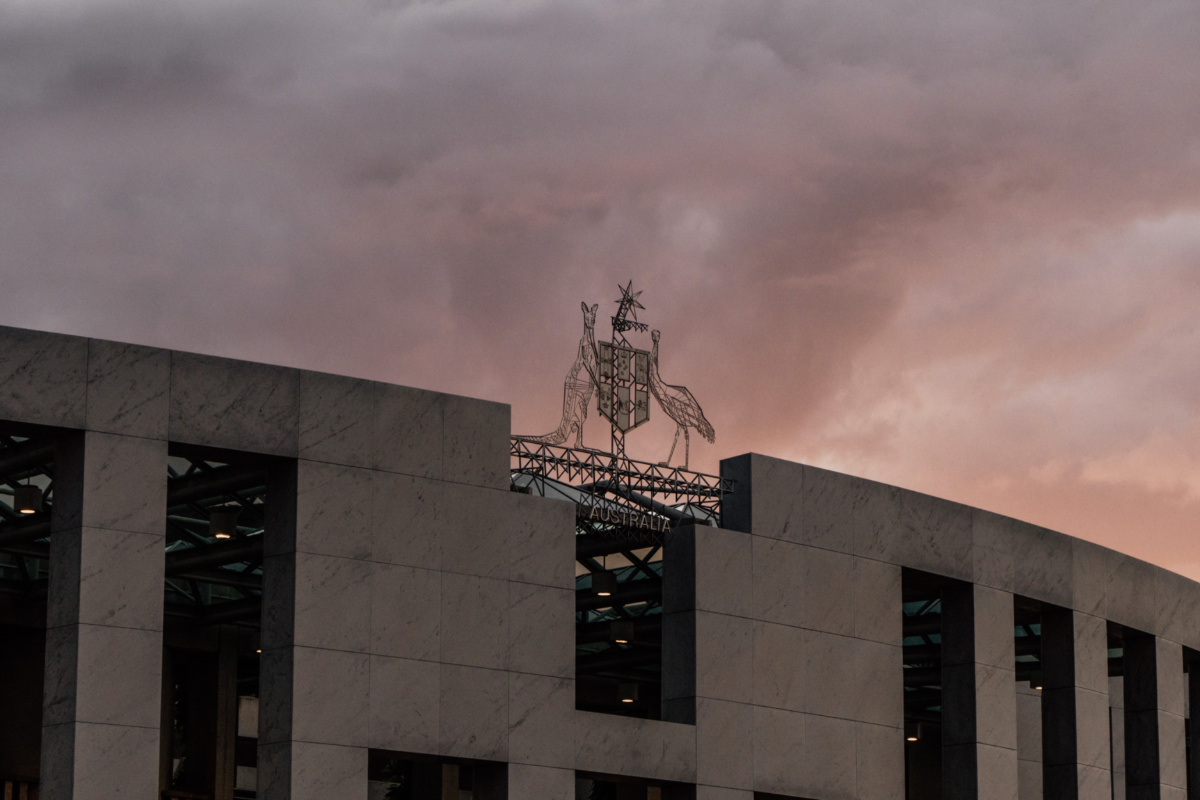Australian Prime Minister Scott Morrison will introduce legislation into federal parliament on 25th November that makes discrimination on the grounds of religious belief unlawful across several areas of society, including employment.
It’s expected a vote on the Bill could take place next week, with a Senate inquiry to consider the laws before they are enacted.

Australia’s Parliament House where the government’s proposed religious freedom legislation is expected to be introduced on Thursday. PICTURE: Josh Withers/Unsplash.
Several groups have voiced concerns about the protections afforded, but Federal Attorney-General Michaelia Cash on Wednesday said the Bill would protect Australians of faith.
“I believe this Bill will give Australians of faith confidence; confidence to be themselves and confidence in the country they belong to,” Cash told Vision Radio.
“In relation to the Folau clause, as it related to the employer conduct rules, we have removed that from the Bill, but we removed it on the basis that the existing protections for indirect discrimination – including in the workplace – will protect employees who face discrimination and that they are still able to make a claim in this regard.”
The Folau clause was named after Israel Folau, who posted a meme on social media about damnation of people, including homosexuals and adulterers. The removed clause would have made it unlawful for employers to introduce a code of conduct limiting someone’s ability to make statements of belief.
Cash said the statement of belief was an “incredibly important” clause, ensuring free speech, “civil and respectful debate”.
“The Bill ensures that people can’t be persecuted for moderately expressing a reasonable opinion”, made in good faith that is not discriminatory under any Australian anti-discrimination law.
She said an important aspect of the Bill was in allowing religious schools to continue their ethos.
“The Bill recognises that religious schools must be free to uphold the tenets of their faith and ethos that makes their school a community; the Bill absolutely endorses that,” she said.
In the state of Victoria, however, proposed legislation would limit those religious bodies and schools could discriminate against on the basis of religion. This would be dependent on those schools or bodies publicly stating their requirements for employment.
Vanessa Cheng, CEO of the Australian Association of Christian Schools which has been lobbying the Victorian Government about the impact its anti-discrimination legislation will have on their member schools, said the Federal Bill was a “long overdue reform” which they welcomed.
“Australians will finally be protected by federal law for their religious belief in the same way they are currently protected against discrimination based on their
age, race and disability,” said Cheng.
“This Bill is good news for Christian schools, as it clearly states that religious schools can prefer to employ people of the same faith, without being accused of discrimination, which is fundamental for maintaining our schools’ mission and ethos.”
Melbourne’s Catholic Archbishop Peter Comensoli told national broadcaster RN Breakfast on Tuesday it was good that a bill which protected the rights of people of faith was being proposed.
“Something is better than nothing. Certainly there are elements which are no longer going to be in the bill which we would perhaps have liked to have in there,” said the Archbishop, who is also chair of the Bishops’ Commission for Life, Family and Public Engagement.
We rely on our readers to fund Sight's work - become a financial supporter today!
For more information, head to our Subscriber's page.
A joint statement from faith leaders this week said protections against religious discrimination at a federal level were long overdue and were needed because few, if any, such legislative protections existed based on people’s religious identity and belief.
There were also inconsistencies in the manner in which states and territories had addressed the issue, “if at all” compared to federal legislation that provided protection against discrimination based on other attributes.
“Although we have not seen the Bill, we understand from our discussions with the government that some of the measures present in earlier exposure drafts have been removed, such as the protections against employer codes of conduct that restrict religious speech outside the workplace, and the conscience protection for healthcare professionals. We would have preferred that these protections had been retained in some form,” the leaders, including from the Christian, Jewish and Muslim faiths said.
“Based on what we have been informed will be the contents of the Bill, we welcome this Bill because it will protect people of faith from discrimination on the basis of their religious beliefs, and will allow faith- based organisations to act in accordance with their doctrines, tenets and beliefs without this being disallowed as religious discrimination.” They said there was no “sensible” reason for the legislation to generate a “deeply polarising debate” over religion and it deserved bipartisan support.
The draft legislation, the third since it was initially proposed by then-Attorney-General Christian Porter, includes some provisions that override federal, state and territory anti-discrimination laws.
This includes making “statements of belief” immune from legal consequences, and that it would not be religious discrimination for bodies such as religious schools, hospitals or aged care facilities to hire people aligned with their particular faith.
Writing in The Conversation on Thursday, Associated Professor of Constitutional Law at Monash University, Luke Beck, sadi federal parliament may not have the constitutional power to enact all its proposed legislation.
Beck argued the draft legislation may be in conflict with international human rights laws; state tribunals which hear anti-discrimination cases may be thrown into chaos because they cannot consider federal laws; and the “statement of belief” provision appears to actually amend or change the content of state and territory laws, something federal parliament cannot do.






